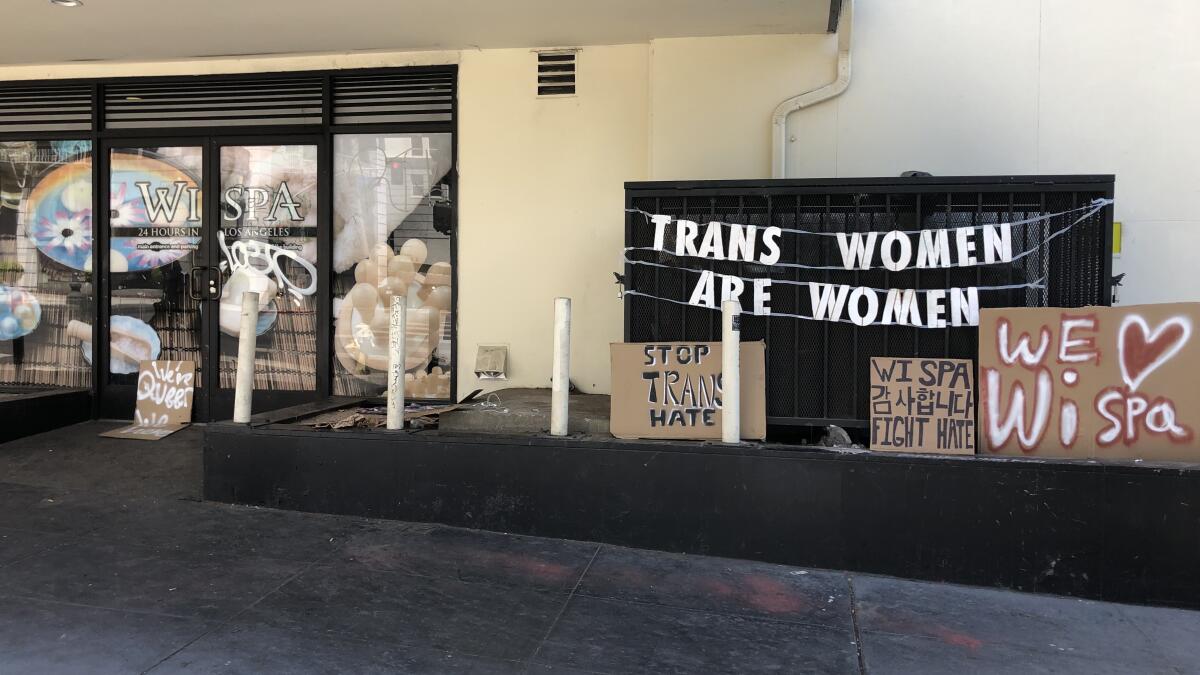Editorial: Transgender spa customers have the same rights as everyone else

The rights of transgender people to act in accordance with their gender identity is fortunately gaining acceptance in many corners — including at the U.S. Supreme Court, which just last week handed a major victory to transgender students seeking to use the school bathrooms of their choice.
But society’s recognition of basic rights for one group also sometimes causes clashes with other groups that have been marginalized or disempowered. That’s why the fracas over a transgender woman using the clothing-optional women’s area of a Koreatown spa is more complicated than it might seem.
There is no doubt that Wi Spa did the right thing in defending the right of a transgender customer to be nude in the women’s area, even though the sight of male-appearing genitalia discomfited at least one female customer, who complained at the front desk. As a public-serving business, Wi Spa had to follow California law forbidding discrimination against transgender people. What’s extraordinary isn’t that the spa’s employees followed the law but that this led to violence outside as opponents and supporters of the law clashed over the weekend.
At the same time, that doesn’t make everyone who feels uncomfortable in such scenarios a bigot. There are women who have been through personal experiences such as sexual assault who might find such a situation intimidating. It could go against the convictions and traditions of observant Muslims and Jews, who have a conservative or orthodox interpretation of gender norms and might themselves feel marginalized for their traditionalist beliefs. Right now, entrepreneurs may not create businesses solely for those who don’t want to be exposed to transgenderism; those businesses, too, would have to follow anti-discrimination laws.
As complicated as the opposing beliefs might be, it is clear where the rights in this matter land. Everyone — transgender customers, members of every faith and women who are upset by the sight of penises — has the right to use the spa and other public accommodations. It just happens that in this case, the public accommodation also includes nudity.
But no one has an absolute right to feel comfortable all the time. People have a right to use the spa, but that doesn’t include with it a guarantee that they all will feel at ease with everything they see. They might prefer a spa where a certain amount of body covering is required.
There is reason to think that a lot of the hullabaloo over these situations will ease over time. Young people are far more comfortable with the idea of shared spaces for people of all gender identities and sexes. While the state battled in 2013 over school bathroom and locker room rights for public school students, the Los Angeles Unified School District had been following such a policy for years with little to no discontent among students and parents.
This doesn’t solve the issue of where offended people go if they want a group experience in keeping with their religious traditions. It shouldn’t be impossible for that to happen, considering the strong constitutional protections in this country for freedom of religion. Future U.S. Supreme Court rulings might well grant faith-based groups the right to set up spas and other accommodations that are in keeping with their beliefs. The balance between freedom of religion and freedom of association, on the one hand, and the right to equal protection under the laws, on the other, is a delicate matter over which there is not yet a prevailing societal consensus.
In the meantime, customers of public-serving businesses should be prepared to share space with the public, in all our forms, varieties and customs. Anti-discrimination laws stand for the principle that all are welcome, whether we are comfortable or not.
More to Read
A cure for the common opinion
Get thought-provoking perspectives with our weekly newsletter.
You may occasionally receive promotional content from the Los Angeles Times.










